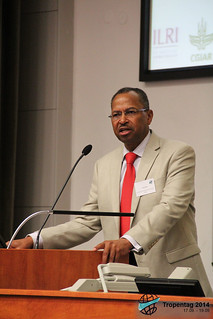
“It’s about making livestock systems more sustainable,” Jimmy Smith said about the research undertaken by the International Livestock Research Institute (ILRI). Speaking at the Tropentag conference this year in Prague, Smith stressed that smallholder livestock producers can meet the growing demand of animal products in developing countries. What is required, however, is a system transformation. In order to be sustainable, such a transformation would result increased productivity with limited resources, or in Smith’s words, “producing more with less.”
As
one of the opening keynote speakers Smith honoured ILRI’s 40th anniversary by providing a historical overview of humanity’s move from hunter-gathers to raising domestic livestock and cultivating crops. The main driver are rapidly growing population and diminishing resources.
These challenges continue today. Thomas Malthus first projected in the 18th century that human population would quickly outstrip the planet’s resource supply. Smith made the valid point that Malthusian theory misses technology and appropriate agricultural technology. And such technology is very important to feed a growing population increasing demand for livestock products. Moreover, Smith argued that the Green Revolution had little to do with livestock. Hence, there are still great strides to be made in improving the productivity and management practices of the sector.
Predominantly composed of smallholders, developing countries actually have considerable capacity to address domestic food and nutrition insecurity with access to new knowledge. Transformation of smallholder animal agriculture is possible by connecting the farmer to value chain actors and livestock technicians, who can transfer the knowledge developed in research institutions. Particularly considering the greenhouse gas emissions and land degradation caused by suboptimal livestock systems, Smith noted the essential role improved animal breeds and feed play in achieving long-term sustainability.
What we need now is the next “agricultural revolution” – one for livestock. Such transformation has the great potential to lead to a more nourished, healthier, environmentally sound planet.
Blog post by Pramila Thapa and Rachel Friedman
 “It’s about making livestock systems more sustainable,” Jimmy Smith said about the research undertaken by the International Livestock Research Institute (ILRI). Speaking at the Tropentag conference this year in Prague, Smith stressed that smallholder livestock producers can meet the growing demand of animal products in developing countries. What is required, however, is a system transformation. In order to be sustainable, such a transformation would result increased productivity with limited resources, or in Smith’s words, “producing more with less.”
As one of the opening keynote speakers Smith honoured ILRI’s 40th anniversary by providing a historical overview of humanity’s move from hunter-gathers to raising domestic livestock and cultivating crops. The main driver are rapidly growing population and diminishing resources.
These challenges continue today. Thomas Malthus first projected in the 18th century that human population would quickly outstrip the planet’s resource supply. Smith made the valid point that Malthusian theory misses technology and appropriate agricultural technology. And such technology is very important to feed a growing population increasing demand for livestock products. Moreover, Smith argued that the Green Revolution had little to do with livestock. Hence, there are still great strides to be made in improving the productivity and management practices of the sector.
Predominantly composed of smallholders, developing countries actually have considerable capacity to address domestic food and nutrition insecurity with access to new knowledge. Transformation of smallholder animal agriculture is possible by connecting the farmer to value chain actors and livestock technicians, who can transfer the knowledge developed in research institutions. Particularly considering the greenhouse gas emissions and land degradation caused by suboptimal livestock systems, Smith noted the essential role improved animal breeds and feed play in achieving long-term sustainability.
What we need now is the next “agricultural revolution” – one for livestock. Such transformation has the great potential to lead to a more nourished, healthier, environmentally sound planet.
Blog post by Pramila Thapa and Rachel Friedman
“It’s about making livestock systems more sustainable,” Jimmy Smith said about the research undertaken by the International Livestock Research Institute (ILRI). Speaking at the Tropentag conference this year in Prague, Smith stressed that smallholder livestock producers can meet the growing demand of animal products in developing countries. What is required, however, is a system transformation. In order to be sustainable, such a transformation would result increased productivity with limited resources, or in Smith’s words, “producing more with less.”
As one of the opening keynote speakers Smith honoured ILRI’s 40th anniversary by providing a historical overview of humanity’s move from hunter-gathers to raising domestic livestock and cultivating crops. The main driver are rapidly growing population and diminishing resources.
These challenges continue today. Thomas Malthus first projected in the 18th century that human population would quickly outstrip the planet’s resource supply. Smith made the valid point that Malthusian theory misses technology and appropriate agricultural technology. And such technology is very important to feed a growing population increasing demand for livestock products. Moreover, Smith argued that the Green Revolution had little to do with livestock. Hence, there are still great strides to be made in improving the productivity and management practices of the sector.
Predominantly composed of smallholders, developing countries actually have considerable capacity to address domestic food and nutrition insecurity with access to new knowledge. Transformation of smallholder animal agriculture is possible by connecting the farmer to value chain actors and livestock technicians, who can transfer the knowledge developed in research institutions. Particularly considering the greenhouse gas emissions and land degradation caused by suboptimal livestock systems, Smith noted the essential role improved animal breeds and feed play in achieving long-term sustainability.
What we need now is the next “agricultural revolution” – one for livestock. Such transformation has the great potential to lead to a more nourished, healthier, environmentally sound planet.
Blog post by Pramila Thapa and Rachel Friedman 




Comments
Post new comment